As apples dangle from trees, pears turn to a burnt orange and pomegranates burst at their seams with plump tiny fruits, it’s a reminder that we are in Fall harvest season. After the dramatic, solemn day of Yom Kippur, we suddenly jump into the celebratory, abundant harvest festival of Sukkot. This is the ultimate farm-to-table holiday that pre-dated the Slow Food movement by a few thousand years.
Sukkot is yet another reminder of the beautiful cyclical nature of Jewish life. From weekly cycles marked by Shabbat to agricultural cycles (the agricultural holidays of Sukkot, Pesach and Shavuot, plus the counting of the Omer), to year cycles that begin each Fall to the seven year cycles of Shmita, Jewish life is communal and circular: always expanding, growing and evolving with each cycle.
Launching Neesh Noosh in this new Jewish year of 5775, with the intention to create recipes following the seasonality of my farmers markets, has the added bonus of considering the implications of this being a Shmita year. Shmita, which means release, is a seven year cycle in Judaism that since the founding of Israel, has only practiced by ultra Orthodox Jews in the country. To briefly summarize, during a Shmita year, “debts would be forgiven, agricultural lands would lie fallow, private land holdings would become open to the commons, and staples such as food storage and perennial harvests would be freely redistributed and accessible to all.”
What I especially am excited about for this year is that Jews are having conversations about the implications of Shmita outside of Israel. As is noted in the fantastic Hazon Shmita Guide, “there are few” right answers” around how Shmita was observed historically and how we might observe it today.” It’s ours to define how we can infuse more ethical and just values into both our Jewish and secular economic and agricultural systems.
Through the lens of Shmita, we can shift institutional practices that address hunger in our communities from hand-outs to developing sustainable local food systems (Food Relief: Beyond the Cans) and change our food procurement practices at home and in our communities. And, we can work to change our political system to one that is more supportive of small farmers growing fruits and vegetables.
How can one apply the values of Shmita during Sukkot, the harvest festival? According to the Mishne Torah, Hilchot Shmita v Yovel (4:3), “the only produce of the Shmita Year of which one may partake are the harvest of fruit trees and vines, as well as wild plants that are not typically sown in a garden.” These are perennial plants; they grow in cycle with the earth every year. They return, unlike annuals that are planted each year.
Based on the ideas of Shmita, I am inspired to create Shmita-friendly dishes. I created a Sukkot recipe that uses several perennial fruit tree ingredients to create a one-pot dish that can be easily carried from one’s kitchen to sukkah. I was able to stop this morning at the Plummer Park farmers market in West Hollywood where there was an abundance of Fall fruits. I picked up organic apples (Gala, Summerfeld and Pink Lady), pears (Barlett and Asian), pomegranates, quinces and persimmons (Fuyu).
Perennials Roast
Ingredients:
2 large apples, thickly sliced
1 large pear, thickly sliced
1/3 cup raisins
5 Medjool dates, cut into pieces
3/4 cup unsalted, raw chopped mixed nuts (I used almonds and pistachios)
1/2 pomegranate, seeded
1/2-1 tbsp pomegranate molasses (optional)
1 tbsp olive oil
tiny pinch of cardamom
pinch of cinnamon
pinch of salt
Preparation:
1. Pre-heat oven to 400 degrees
2. Wash and thickly cut fruit
3. Line baking sheet or tray with parchment paper. Add fruit and drizzle with olive oil. Add cinnamon, cardamom and salt.
3. Roast for approximately 45-60 minutes until soft, lightly browned. In the last 20 minutes, add chopped dates. In the last 5-10 minutes, add raisins
4. While fruit is roasting, toast nuts until browned. Cut and seed pomegranate.
5. Remove fruit from oven. Let sit for a couple of minutes.
6. Transfer fruit to serving platter. Fold in nuts. Add pomegranate seeds and drizzle pomegranate molasses over top. Serve warm.
PS: Leftovers? Enjoy over a bowl of oatmeal or blend into a smoothie.

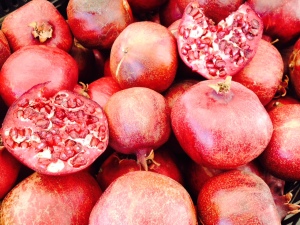
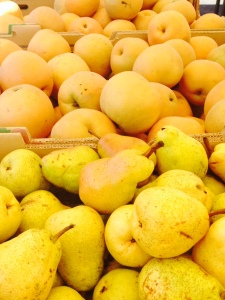
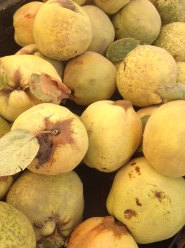
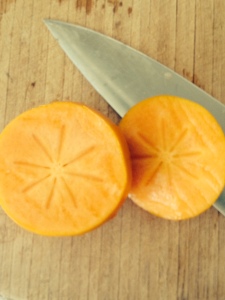
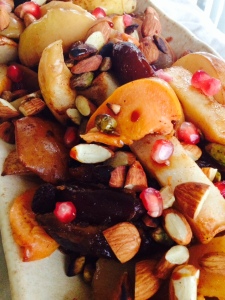
Recipe looks yummy. Will have to try it! Nice blog.
LikeLiked by 1 person
Thanks so much!!
LikeLike
HI. Saw this on Shmita Network list which you might want to publicize here – almost didn’t open it cuz of the word “roast” – thought it was a meat recipe! Great photos. Nice writing. I would work to make these posts shorter. Ah, West Hollywood – lived on Willoughby for a year as a kid and went to Melrose Avenue Elementary for 4th grade – a fine expeirence for a newcomer (or returnee) to the U.S. Good luck with it!
LikeLiked by 1 person
So great you found the blog and enjoyed this post! the Shmita Network is listed on the resources page but thanks for the reminder that I should also mention it in my blogs. I’m vegetarian so you won’t find any meat roasts on my blog 🙂
LikeLike
p.s. I forgot to mention: shmita is observed in Israel not only by ultra Orthodox Jews but by all Orthodox Jews and others as well. I would encourage you to correct this on your blog post. 🙂
LikeLike
thanks for the clarification
LikeLike
Great pics! And your roasted fruit compote sounds/looks delicious. Love learning about the history of your faith. Count me in as a new follower of your blog!
LikeLiked by 1 person
So glad you enjoyed this post and I greatly appreciate your following the blog! More yummy stuff coming soon!
LikeLike
Pingback: Shmini Atzeret: Eating in a California drought | Neesh Noosh
Pingback: Noah: Ark of Taste | Neesh Noosh
Pingback: Chayei Sarah: Life and Death | Neesh Noosh
Pingback: Fall Holidays: Feasting and Reading | Neesh Noosh™
Pingback: L’Shana Tova: Rosh Hashana Recipes Round-Up | Neesh Noosh™
Pingback: Rosh Hashana: Easy Baked Apples | Neesh Noosh
Pingback: Sukkot: Poverty and Ecology (and Stuffed Spaghetti Squash) | Neesh Noosh
Pingback: Sukkot: Roasted Apples and Yams with Barberries | Neesh Noosh
Pingback: Sukkot & Simchat Torah: Stuffed eggplants | Neesh Noosh